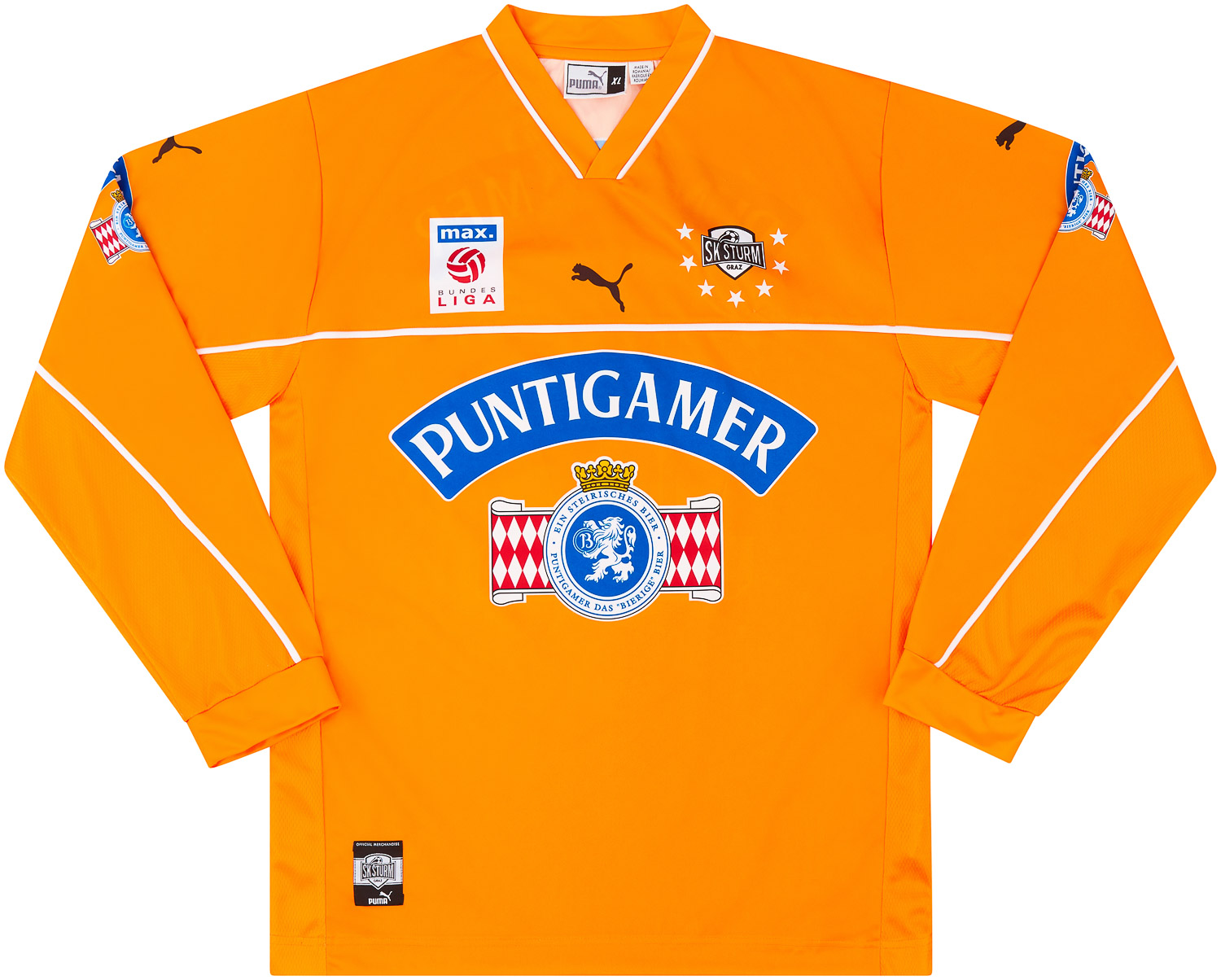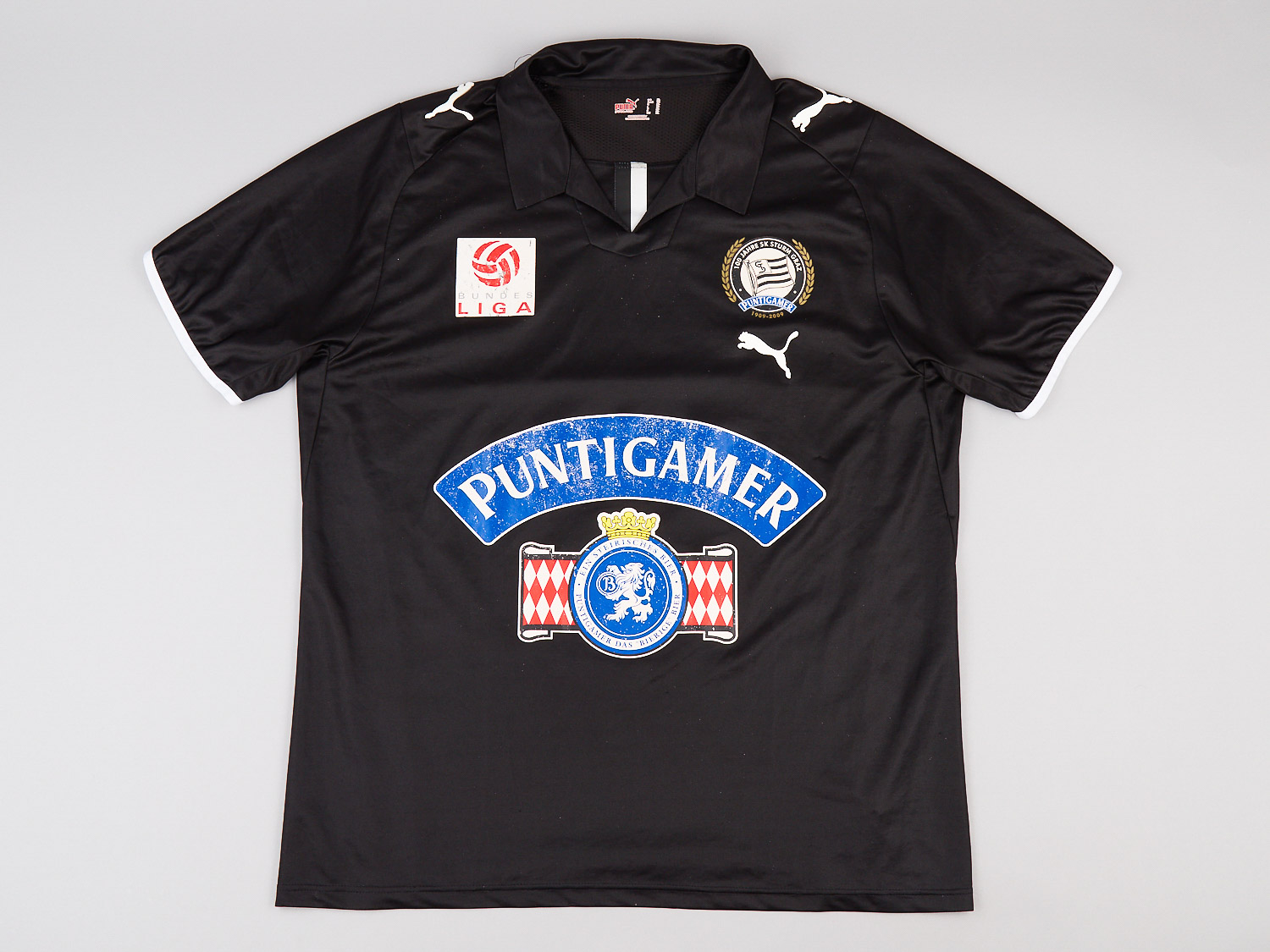Sturm Graz
Introduction Sport-Club Sturm Graz, commonly referred to as Sturm Graz, is one of Austria’s most storied and celebrated football clubs. Founded in 1909 and based in the picturesque city of Graz, the club has a rich identity steeped in tradition and passion. Representing the vibrant culture of Styria, Sturm Graz boasts a dedicated fanbase and […]
1998-99 Sturm Graz Home Shirt - 8/10 - (XXL)
148.99£ - ca: €176
1998-99 Sturm Graz GK Shirt Sidorczuk #1 - 8/10 - (S)
106.99£ - ca: €126
1999-00 Sturm Graz Home Shirt Martens #14 - 9/10 - (S)
94.99£ - ca: €112
2001-02 Sturm Graz Match Issue Away L/S Shirt #17
94.99£ - ca: €112
1999-00 Sturm Graz Away Shirt - 8/10 - (XL)
94.99£ - ca: €112
2001-02 Sturm Graz Away Shirt - 8/10 - (XXL)
82.99£ - ca: €98
2002-05 Sturm Graz Home Shirt - 8/10 - (S)
82.99£ - ca: €98
2017-18 Sturm Graz Home Shirt (3XL)
82.99£ - ca: €98
2001-02 Sturm Graz Away Shirt - 9/10 - (S)
82.99£ - ca: €98
2002-03 Sturm Graz GK Shirt - 8/10 - (XL)
82.99£ - ca: €98
2000-01 Sturm Graz GK Shirt - 8/10 - (L)
82.99£ - ca: €98
2001-02 Sturm Graz Away Shirt - 8/10 - (XXL)
82.99£ - ca: €98
2007-08 Sturm Graz GK Shirt Schicklgruber #22 - 7/10 - (XL.Boys)
70.99£ - ca: €84
2016-17 Sturm Graz Home Shirt Alar #9 - 8/10 - (L)
70.99£ - ca: €84
2007-08 Sturm Graz GK Shirt - 9/10 - (L)
70.99£ - ca: €84
2017-18 Sturm Graz Home Shirt Puchegger #22 - 9/10 - (M)
58.99£ - ca: €70
2010-11 Sturm Graz Home Shirt - 8/10 - (S)
58.99£ - ca: €70
2012-13 Sturm Graz Away Shirt - 8/10 - (M)
58.99£ - ca: €70
2010-11 Sturm Graz Home Shirt Szabics #11 - 7/10 - (S)
58.99£ - ca: €70
2014-15 Sturm Graz Third Shirt Stankovic #10 - 6/10 - (M)
53.99£ - ca: €64
2001-02 Sturm Graz Third Shirt - 7/10 - (XL.Boys)
53.99£ - ca: €64
2015-16 Sturm Graz Home Shirt - 9/10 - (M)
47.99£ - ca: €57
2017-18 Sturm Graz Home Shirt - 7/10 - (L)
47.99£ - ca: €57
2009-10 Sturm Graz Home Shirt - 6/10 - (S/M)
47.99£ - ca: €57
2000-01 Sturm Graz Home Shirt - 8/10 - (XL.Boys)
41.99£ - ca: €50
2009-10 Sturm Graz Home Shirt - 7/10 - (XS)
41.99£ - ca: €50
2011-12 Sturm Graz Home Shirt - 8/10 - (XS)
41.99£ - ca: €50
2018-19 Sturm Graz Home Shirt - 8/10 - (S)
41.99£ - ca: €50
2010-11 Sturm Graz Home Shirt - 9/10 - (XS)
41.99£ - ca: €50
2016-17 Sturm Graz Away Shirt - 7/10 - (L)
41.99£ - ca: €50
2000s Sturm Graz Away Shirt - 6/10 - (XL)
35.99£ - ca: €42
2020-21 Sturm Graz Home Shirt - 6/10 - (3XL)
35.99£ - ca: €42
2009-10 Sturm Graz 'Signed' Home Shirt - 8/10 - (S/M)
35.99£ - ca: €42
2018-19 Sturm Graz Lotto Training Shirt - 10/10 - (M)
29.99£ - ca: €35
2018-19 Sturm Graz Home Shirt - 10/10 - (L.Boys)
23.99£ - ca: €28
2019-20 Sturm Graz Lotto Training Shirt - 8/10 - (XXL)
23.99£ - ca: €28
2015-16 Sturm Graz GK Shirt - 5/10 - (XL)
23.99£ - ca: €28
2017-18 Sturm Graz Home Shirt - 9/10 - (Women's XL)
23.99£ - ca: €28
2008-09 Sturm Graz Home Shirt - 4/10 - (M)
18.99£ - ca: €22
2019-20 Sturm Graz Third Shorts - 6/10 - (S)
17.99£ - ca: €21
2014-15 Sturm Graz Home Shorts - 7/10 - (XXL)
17.99£ - ca: €21
Introduction
Sport-Club Sturm Graz, commonly referred to as Sturm Graz, is one of Austria’s most storied and celebrated football clubs. Founded in 1909 and based in the picturesque city of Graz, the club has a rich identity steeped in tradition and passion. Representing the vibrant culture of Styria, Sturm Graz boasts a dedicated fanbase and a reputation for competitive spirit in Austrian and European football. The club’s nickname, “Die Schwarze Elf” (The Black Eleven), echoes its iconic black and white kit, embodying the pride and fervor that the team inspires among its supporters.
Club History
Sturm Graz was established on April 1, 1909, by a group of local football enthusiasts. The club initially participated in regional leagues before joining the Austrian football championship system. The pre-war period saw the club establish itself as a competitive force in Austrian football, though it was after World War II that Sturm Graz began to achieve greater prominence. The club’s first major success came in 1949 when they won their first Austrian championship, paving the way for future glories.
A turning point in the club’s history occurred in the 1990s when Sturm Graz experienced a renaissance under the management of Otto Baric. The team secured their second domestic title in the 1997-1998 season and followed it up with more success in the early 2000s. Sturm Graz’s blending of young talent and experienced players saw them build a competitive squad that put the club firmly back on the footballing map.
Achievements
Sturm Graz has a formidable record in both domestic and European competitions. The club has clinched the Austrian Bundesliga title multiple times, with championships coming in 1998, 1999, 2000, and 2001, amassing a total of 15 league titles by 2023. Adapting to competitive challenges, Sturm Graz also laid claim to the Austrian Cup on several occasions, securing victories in 1951, 1956, 1996, 1997, and 2011, among others, which showcases their ability to perform in various tournament formats.
On the European stage, Sturm Graz’s most notable achievement came in the 1999-2000 season when they reached the group stage of the UEFA Champions League. The club’s participation in European tournaments has been a source of pride for fans, reflecting their ambition and hard work on the field, indicating their role as a key player within Austrian and continental football.
Significant Players and Matches
Over the years, Sturm Graz has seen numerous talented players wearing its colors. Notable figures include former Austrian international players like Ivica Vastic and Franz Schmidt, who have brought skill and leadership to the squad. Additionally, players such as Mario Götze and current star player, David Schrott, have made significant contributions to the team’s success.
Momentous matches have defined the club’s history, with one of the most memorable being the dramatic cup final victory in 1996 against Rapid Vienna, which solidified their status as a dominant force in Austrian football. Another landmark event occurred in 2011 when Sturm Graz won the Austrian Cup after a thrilling encounter against FC Kärnten. Both matches exemplify the club’s resilience and competitive spirit.
Cultural Impact
Sturm Graz holds a special place not only in the footballing landscape but also in local culture. The club’s home stadium, the Merkur Arena, is a focal point for community gatherings, drawing passionate supporters who create an electrifying atmosphere during matches. The club’s colors and mascot incorporate local symbols, fostering a sense of identity and pride among its fans.
The vibrant fan culture surrounding Sturm Graz illustrates the club’s deep roots in the community. The supporters, known as the “Black and White Army,” are renowned for their loyalty and dedication, regularly filling the stands to cheer on their team. Various fan groups contribute to the culture of the club, organizing chants, displays, and events that strengthen the bond between the club and its supporters, thus highlighting the significance of Sturm Graz in the hearts of its locals.
Conclusion
Sturm Graz is much more than just a football club; it is a representation of passion, history, and community spirit in Austrian football. With a wealthy legacy enriched by numerous achievements, the club continues to be a cornerstone of Graz and Austrian football, inspiring future generations of players and fans alike. As they navigate the competitive landscape, Sturm Graz remains a symbol of excellence and a beacon of fervor for its unwavering supporters.








































